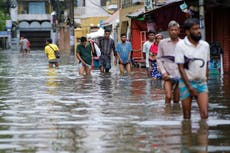Balochistan: Drone footage shows scale of flood devastation in Pakistan
‘During the last 100 years, I don’t remember seeing a downpour like this,’ says 105-year-old Khan Bibi
A series of flash floods has left a trail of destruction in one of the most vulnerable and impoverished areas of Pakistan, ruining human lives and property.
Drone footage from the southwestern province of Balochistan shows just some of the thousands of houses destroyed as people scramble to save what is left. Torrential rains and flash floods in the last few weeks have killed at least 136 people and displaced thousands.
Dozens of people are missing, while thousands have been forced to live in the open under extreme heat, raising concerns that the death toll may further climb.
Some of the heavily impacted villages lie just on the outskirts of the provincial capital Quetta, but rescuers are finding it tough to reach those in the interior areas of the mountainous region, which lacks proper connectivity.
Floods have washed away key infrastructure like hospitals, schools, bridges, and roads, including those that connect these areas to Quetta and neighbouring provinces.
The water in the area has receded but forecasters say more rains are expected in the coming weeks, leading to concerns of a bigger calamity in the area.
Drone footage and images captured by the international aid agency Islamic Relief show the rugged terrain strewn with debris and muck. Mud houses have been reduced to rubble, while concrete structures have been gutted beyond recognition.
The region’s inhabitants, most of whom live below the poverty line, have been left in a state of shock at the crisis and are scrambling for basic relief materials.
While flash floods are a yearly occurrence in the region, this year’s flooding was more intense than normal. The impact of flash floods is often made worse by improper infrastructure and weak homes constructed with mud and stones.
As in the case of flooding in Bangladesh and parts of northeast India earlier this year, the human-caused climate crisis has played a role in worsening Balochistan’s floods by making rainfall heavier and more erratic.
Victims say they haven’t seen anything like this in decades after a massive downpour inundated their village in just a few hours, with flash floods sweping away homes and leaving them scrambling to secure whatever is left of their belongings.
“Our area was affected by water scarcity and less rainfall and now it rained for four hours and swept away everything, even our hopes as well,” said octogenarian farmer Abdul Qadir.
“Rain is usually a relief in our area, but this was terrifying,” a resident identified as Naseeb Ullah, whose house was reduced to rubble, told Islamic Relief.
“During the last 100 years, I don’t remember seeing a downpour like this in Panjpai,” said 105-year-old Khan Bibi, the oldest resident of Mian Khanzai village.
The organisation that is helping these victims says most people were forced to evacuate their homes with no food or basics. Now, they face the challenge of rebuilding their houses even though more rain is expected soon.
Unfortunately, we are seeing the reality of climate change hitting the poorest and least responsible.
Many residents spend their nights out in the open as they are homeless. But after the rains, temperatures typically rise, posing the problem of heat to the vulnerable population.
The sparsely populated area usually receives heavy rainfall over long periods of the monsoon. But according to World Weather Attribution, climate change has likely made flooding and extreme rains more frequent in some locations.
The sixth assessment report by Intergovernmental Panel on Climate Change (IPCC) said South Asia is extremely prone to high-frequency flood risk.
“With more floods expected to hit Pakistan in the coming days, some of the most vulnerable communities will be affected,” Tufail Hussain, director of Islamic Relief UK, said.
“This is a race against time to help people who have lost their homes and means to make a living.”
Join our commenting forum
Join thought-provoking conversations, follow other Independent readers and see their replies
Comments





Bookmark popover
Removed from bookmarks